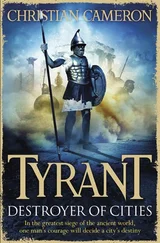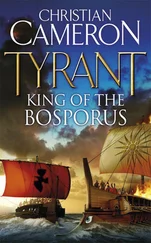Christian Cameron - Force of Kings
Здесь есть возможность читать онлайн «Christian Cameron - Force of Kings» весь текст электронной книги совершенно бесплатно (целиком полную версию без сокращений). В некоторых случаях можно слушать аудио, скачать через торрент в формате fb2 и присутствует краткое содержание. Год выпуска: 2014, Издательство: Orion Publishing Group, Жанр: Исторические приключения, на английском языке. Описание произведения, (предисловие) а так же отзывы посетителей доступны на портале библиотеки ЛибКат.
- Название:Force of Kings
- Автор:
- Издательство:Orion Publishing Group
- Жанр:
- Год:2014
- ISBN:нет данных
- Рейтинг книги:4 / 5. Голосов: 1
-
Избранное:Добавить в избранное
- Отзывы:
-
Ваша оценка:
- 80
- 1
- 2
- 3
- 4
- 5
Force of Kings: краткое содержание, описание и аннотация
Предлагаем к чтению аннотацию, описание, краткое содержание или предисловие (зависит от того, что написал сам автор книги «Force of Kings»). Если вы не нашли необходимую информацию о книге — напишите в комментариях, мы постараемся отыскать её.
Force of Kings — читать онлайн бесплатно полную книгу (весь текст) целиком
Ниже представлен текст книги, разбитый по страницам. Система сохранения места последней прочитанной страницы, позволяет с удобством читать онлайн бесплатно книгу «Force of Kings», без необходимости каждый раз заново искать на чём Вы остановились. Поставьте закладку, и сможете в любой момент перейти на страницу, на которой закончили чтение.
Интервал:
Закладка:
Anaxagoras nodded. ‘I know that Apollodorus wears his amulet, and so does Charmides.’ He smiled. ‘Does it trouble you?’
Satyrus shrugged. ‘When I was a boy, I thought that he spoke to me. And when I was sick last year, he and Philokles seemed to visit me constantly. And yet Philokles never suggested to me that my father was anything but a good man. A difficult standard by which to measure myself, a worthy one, but no more.’ He shrugged again. ‘As I grow older, I find … how can I say this? I find the idea of my father’s deification a little offensive. Obscene.’
Anaxagoras nodded. ‘I’m trying to imagine how I would feel if my own father were deified.’ He laughed. ‘And I can’t. A good man of business — a pious man and a good father for a ne’er-do-well son. But godhood is not in him, and when he passes, his shade will not reach to the heavens for apotheosis.’ Anaxagoras rubbed his beard. ‘I’m not sure he’d want it even if offered.’
Satyrus took a deep breath. Then he changed his mind. ‘Tomorrow?’ he asked.
Apollodorus nodded. ‘Why don’t we stop being so serious, walk down to the pier, and see?’
The land breeze of the early morning found them already clear of the harbour mouth, the great mainsail rigged to catch the world’s wind, a gentle Boreas blowing them west, almost dead astern on their track for Athens after they weathered the northern promontory of Rhodos. The ships that had been laden with grain for Rhodes were full now of copper from Cyprus, cedar planks from Lebanon, skilled slaves who would become freemen in a year or two at Tanais or Pantecapaeaum, marble, spices and even a consignment of fine Aegyptian furniture for a rich merchant in Olbia. They also had the hard silver specie that had paid for the abundance of grain. Two days later, he sent them away north off Lesbos, under guard of half his ships, with Diokles, his most trusted trierarch, in command.
Aekes, a small, fiery man, brought his Ephesian Artemis off the beach in style and rowed away west — the scout ship. Satyrus followed him with two penteres, two triemiolas, and six triremes; almost a quarter of his full fleet, and some of the best ships — and some of his rawest, too.
He missed Diokles already, having seen little enough of the man in Rhodos, but keeping all of his best captains at his side all the time was poor strategy and unfair to them. He kept Aekes, though, because he could be trusted with anything — he had worked his way up to trierarch from the starting position of a Spartan helot, and he owed Satyrus his status, his citizenship, and his fortune.
Steering his own penteres — not his beloved Arete , lost to fire in the siege of Rhodos, but Medea , a smaller, lighter fiver built in Olbia — Satyrus pondered on Athens as a destination and what this visit meant to him. More than just seeing Miriam — although seeing Miriam was the greatest part of it, he admitted to himself. He must decide, before his prow touched the great pier at Piraeus, whether he meant to marry her. But there were other opportunities in Athens, other perils — he was a citizen there, and one whose activities made him both famous and infamous; a hero and a monster. Demetrios the besieger was the city’s current lord. Satyrus wanted to land in Athens ready for anything that might transpire. He wanted to be done with his state of war against Demetrios because, among other things, he expected shortly to be at war with Lysimachos.
Looking at Anaxagoras, taking a nap in the sun, Satyrus thought back to their last conversation in Rhodes and frowned to himself. Hard to lie to a friend. Harder to hide from yourself. Satyrus’s sense of bitterness — betrayal, even — over Amastris’s change of heart was deeper than he wanted to admit to another man. He told himself that the feeling was not just the jealousy of the jilted lover. He reminded himself that he would have lain with Miriam a hundred times — a thousand — during the siege, had she only been willing. He allowed that Amastris was a ruler, as he was, and had duties to her city, as he did.
Despite all of that, he couldn’t think of her without a rush of anger. Her decision to marry the Satrap of Thrace — a major player in the war against Antigonus — made war with Lysimachos almost certain; a war that would pit him against Ptolemy, if not in immediate fact, then in form, and would have repercussions across his personal, professional and mercantile life. It was this that had caused him to be so very careful of the trierarchs he chose to take to Athens. He wanted only his most trustworthy men, men who would look after his interests even when offered major bribes, even when threatened. He had no idea what the city might try to do. But he needed to keep the door opened by the truce with Demetrios ajar, at least, even if it meant trading with the enemy. Amastris’s wedding had put him there, and he had no choice but to react this way.
Or that’s what he told himself.
So he had Aekes scouting ahead, and Anaxilaus and his brother Gelon — both aristocrats from Sicily, wealthy men and no friends to Athens. They had Oinoe and Plataea . And Daedelus of Halicarnassus brought up the rear of the column in another heavy penteres — Glory of Demeter , a famous ship.
He could not take only his most trustworthy captains, however. None of the rest of his captains were remarkable men, and all of them were new to him — he had Eumenes of Olbia’s son Ajax, a fine young man with a fine new ship called Apollo of Olbia , and two ships from Pantecapaeaum commanded by relatives of his former adversary, Heron, the last Tyrant of Pantecapaeaum — Lykeles son of Draco, and Eumeles son of Tirseus, both too young to have reputations. They had light triremes — Tanais and Pantecapaeaum .
And finally, he had a pair of Rhodian-built triemiolas, decked triremes with a half deck for carrying full sail and more sailors — or marines. Their captains were prosperous men who had been made by Leon: Sandokes of Lesbos, a foppish man famed for his daring navigation, trierarch of the powerful Marathon and the Etruscan; and Sarpax, whom Leon had employed for twenty years. Satyrus could see Sarpax from the helm, because the tall Etruscan was standing in the bow of his Desert Rose just a few horse lengths astern of Medea .
He put the inexperienced men in the middle of his line, the way a good strategos would place them in the phalanx. They had expert helmsmen to help them — his money and reputation now attracted some of the best on the ocean.
It was all very satisfying. He looked back down the line of his fighting ships, all heeling well to starboard with the press of wind, sails well set, the ropes that crossed them appearing to be restraints on mighty Boreas himself. And behind his warships, sixteen heavy merchants — six Athenian grain ships, towering over the rest, and ten of his own. A fortune in grain, carefully guarded, representing the wealth of his kingdom and a new avenue of diplomacy. Grain for Athens.
Where Stratokles had begged him to take it. Stratokles, who had single-handedly engineered Amastris’s betrayal — her wedding to Lysimachos.
On the bench built under the rising strakes of the stern by the helmsman’s station, Anaxagoras opened his eyes. ‘Who could doubt the gods on a day like this one?’ he asked.
Satyrus smiled and looked away.
‘Aha,’ Anaxagoras said, swinging his feet onto the planks of the deck. ‘You could. Thinking of Miriam?’
Satyrus shook his head. ‘Lysimachos. Cassander. Stratokles.’ The last name he spat.
‘He has done you no disservice,’ Anaxagoras said.
‘Hmm,’ Satyrus said.
‘None, philos. You need to keep everyone a little further away — arm’s length, I think Coenus said.’ Anaxagoras nodded north, towards distant Tanais, where Coenus was regent. ‘The appearance of alliance with Athens will give everyone pause.’
Читать дальшеИнтервал:
Закладка:
Похожие книги на «Force of Kings»
Представляем Вашему вниманию похожие книги на «Force of Kings» списком для выбора. Мы отобрали схожую по названию и смыслу литературу в надежде предоставить читателям больше вариантов отыскать новые, интересные, ещё непрочитанные произведения.
Обсуждение, отзывы о книге «Force of Kings» и просто собственные мнения читателей. Оставьте ваши комментарии, напишите, что Вы думаете о произведении, его смысле или главных героях. Укажите что конкретно понравилось, а что нет, и почему Вы так считаете.












